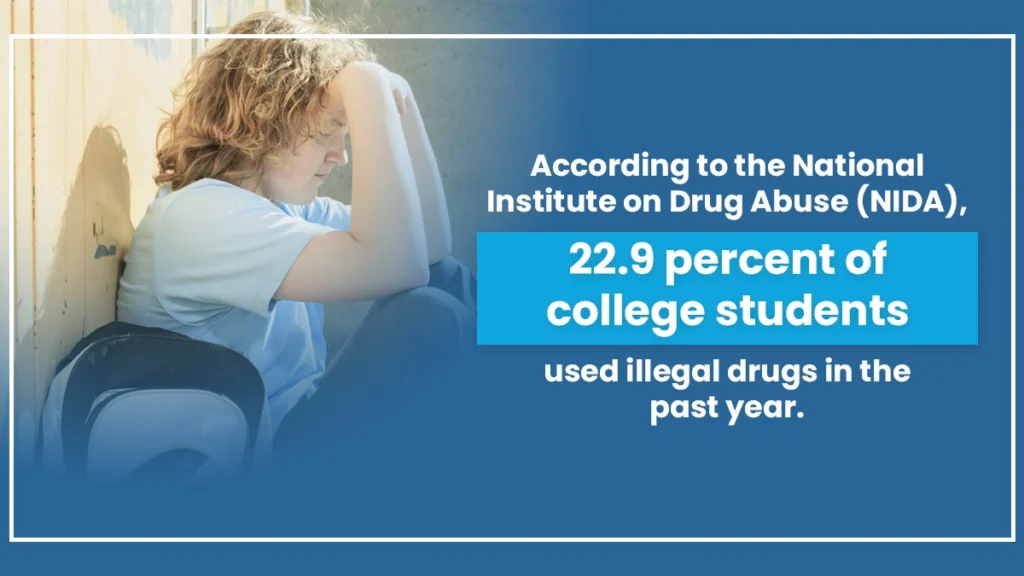College life can be a thrilling adventure of newfound freedom and learning, but it also harbors an alarming concern: addiction. Several factors contribute to this issue.
Stress from academic pressures and peer influence often leads students to seek solace in drugs or alcohol. The ease of access and a desire to fit in can further entangle them in addictive behaviors. Keep reading to learn how students can develop an addiction to drugs or alcohol.

Key Takeaways
College life offers newfound freedom and learning, but addiction is a serious concern due to various factors. Here’s what you need to know:
- About 22.9 percent of college students use illicit drugs (NIDA).
- College campuses pose addiction risks with easy substance access and academic stress.
- Awareness, mental health support, and accessible treatment can lower addiction rates among college students.
The Haven Detox Little-Rock offers specialized services for individuals seeking to overcome addiction. Call us at (501) 271-3342 and set a foundation for your recovery journey.
Prevalence of Addiction on College Campuses
The prevalence of addiction on college campuses in the United States is a pressing concern, as it affects individual students and the overall campus environment. According to the National Institute on Drug Abuse (NIDA), 22.9 percent of college students used illegal drugs in the past year. Marijuana was the most commonly abused drug among college students, with alcohol being the second.
The National Institute on Alcohol Abuse and Alcoholism (NIAAA) reports that 60 percent of college students between 18 and 22 consumed alcohol in the past month. Of these, roughly two out of three engaged in binge drinking.
These statistics highlight the magnitude of the problem, stressing the need for comprehensive prevention and intervention programs on college campuses. To combat addiction effectively, universities and colleges must prioritize the well-being of their students, providing resources and support to address substance abuse issues proactively.
Common Addictions Among College Students
Common addictions among college students include alcohol, marijuana, prescription medications, and nicotine. Peer pressure, academic stress, and newfound freedom can contribute to these addictions. Educational institutions must offer resources to help students make healthier choices during their college years.
Substance Abuse
Alcohol and marijuana are prevalent among college students. The National Institute on Alcohol Abuse and Alcoholism (NIAAA) reports high rates of binge drinking, while marijuana is increasingly popular. Additionally, misuse of prescription medications, such as stimulants and opioids, poses a significant concern.
Behavioral Addictions
Beyond substance abuse, behavioral addictions like gambling, internet or gaming addiction, and excessive use of social media can adversely affect students. The constant connectivity of the digital age can lead to addictive behaviors, impacting academic performance and mental health.
Food Addictions
Unhealthy eating habits and food addiction can also surface during college years. Stress, irregular schedules, and easy access to fast food can contribute to overeating and unhealthy relationships with food.
Impact of Addiction on College Students
Addiction can have far-reaching and detrimental effects on college students, encompassing academic, physical, and psychological well-being. Let’s take a closer look at how addiction affects college students.
Academic Consequences
Addiction often disrupts a student’s academic progress. The need to obtain and use substances can lead to missed classes, assignments, and exams.
Declining grades, academic probation, and even dropout rates may increase due to addiction. Institutions can severely compromise educational aspirations and prospects.
Physical Health Implications
Abusing substances can have adverse effects on a person’s physical well-being. Alcohol and drug misuse can lead to various health issues, such as liver damage, heart problems, and impaired immune function. Risky behaviors associated with addiction, such as unsafe sex or driving under the influence, increase the chances of contracting infections or experiencing accidents.
Psychological and Emotional Toll
Addiction is closely linked to mental health challenges. Students battling addiction experience increased anxiety, depression, and emotional instability.
The cycle of addiction can lead to a sense of hopelessness and low self-esteem. Additionally, withdrawal symptoms and cravings can exacerbate psychological distress.
Relationship Strain
Addiction can damage relationships with loved ones, friends, and classmates. Isolation, lying, and neglecting responsibilities can lead to social alienation and severed connections. Students may become isolated, exacerbating feelings of loneliness and despair.
Financial Burden
Maintaining an addiction can be financially draining. Students may accumulate debt, strain their finances, or resort to illegal moves to support their habit. The financial burden adds stress and further complicates their academic and personal lives.
To mitigate the impact of addiction on college students, institutions should provide accessible support services, including counseling and addiction treatment programs. Prevention efforts, early intervention, and awareness campaigns are also crucial.
Factors Contributing to Addiction Among College Students
Addiction among college students is a multifaceted issue influenced by several interconnected factors. Understanding these factors is crucial in addressing the root causes and supporting this demographic.
Peer Pressure
College life exposes students to new social circles and peer influences. The desire to fit in and establish connections can lead to experiments with drugs or alcohol. Both direct and indirect peer pressure plays a significant role in shaping students’ attitudes toward substance use.
Mental Health
The evolution to college can be emotionally challenging. Many students face increased stress, anxiety, and depression. Some may turn to substances as a coping mechanism. Unaddressed mental health issues can contribute to a vulnerability to addiction.
Academic Pressure
The rigorous demands of college academics, including exams, assignments, and deadlines, can be overwhelming. Students may resort to substance use to enhance focus or alleviate stress. The pressure to excel academically can drive some towards unhealthy habits.
Accessibility
The ease of substance access on college campuses is significant. Alcohol is readily available at social events, and drugs may circulate within peer groups. Easy access increases the likelihood of experimentation and, in some cases, addiction.
Lack of Awareness and Support
Many college students may lack awareness about addiction and its risks. Additionally, some institutions may not provide adequate support systems for students struggling with addiction or mental health issues.
Addiction Prevention Strategies for College Students
Preventing addiction among college students and teenagers is a critical public health priority and a combination of strategies. They are necessary to address this complex issue effectively.
Education and Awareness
Schools and colleges in Arkansas can play a pivotal role in addiction prevention by incorporating comprehensive substance abuse education into their curriculum. Providing students with accurate information about the risks associated with drug and alcohol use can empower them to make informed decisions. Awareness campaigns, workshops, and peer support programs can reinforce these messages.
Healthy Coping Mechanisms
Teaching students healthy coping mechanisms helps with stress management, resilience-building, and emotional regulation. These skills can help students deal with the pressures of academic life without resorting to substance abuse. Encouraging physical activity, mindfulness, and access to mental health activities can contribute to healthier lifestyles.
Policies and Regulation
Arkansas laws surrounding addiction in college students and teenagers should focus on prevention and enforcement. Stricter regulation of alcohol and tobacco sales to minors and penalties for violations can be deterrents. Additionally, rules should support implementing evidence-based prevention programs in educational institutions.
Arkansas can also explore policies that provide greater access to addiction treatment and helping services for needy students. Expanding Medicaid and increasing the availability of treatment facilities can reduce barriers to receiving help.
Overall, a multi-pronged approach that combines education, awareness, and regulation is essential to combat addiction among college students and teenagers in Arkansas.
Treatment of Addiction for Students
Addressing addiction among college students requires a comprehensive approach that includes counseling and therapy, medication-assisted treatment (MAT), and participation in support groups. These interventions provide a well-rounded strategy to help students overcome addiction and regain control of their lives.
Counseling and Therapy
Counseling and therapy are fundamental components of addiction treatment for college students. Through individual and group sessions, students can explore the root causes of their addiction, develop skills, and set recovery goals.
Cognitive-behavioral therapy (CBT) is the most commonly used therapeutic intervention for addiction and mental health concerns. Therapeutic interventions provide a safe and supportive space for students to address addiction’s emotional and psychological aspects.
Medication
Medication-assisted treatment (MAT) is valuable for addressing college students’ addiction. MAT involves using prescribed medications, often in combination with counseling and therapy, to ease withdrawal symptoms, reduce cravings, and support recovery.
Medications like buprenorphine and naltrexone are commonly used for opioid addiction, while drugs such as acamprosate and disulfiram are employed for alcohol addiction. MAT is evidence-based and can significantly enhance the chances of a successful recovery.
Support Groups
Support groups are pivotal in the recovery journey of college students facing addiction. These groups, like Alcoholics Anonymous (AA) and Narcotics Anonymous (NA), offer a non-judgmental, peer-led environment where people can share their incidents, challenges, and successes in battling addiction.
Support groups provide emotional support, accountability, and a sense of community, reducing the isolation often associated with addiction. The camaraderie and guidance from others who have overcome similar struggles empower college students to maintain sobriety.
Frequently Asked Questions (FAQ)
How does substance use affect college students?
Substance use has a significant impact on college students, who are often young adults in pursuit of higher education. According to a national survey, young people, particularly full-time college students, are at a higher risk of drug use.
Marijuana use and misuse of prescription stimulants are common concerns. Substance abuse can lead to substance use disorder, negatively affecting academic performance, mental health, and overall well-being. College students may struggle with addiction in silence, making it crucial for parents and educational institutions to address these issues, provide support, and promote healthy choices among young adults.
What percentage of college students struggle with addiction?
The prevalence of addiction among college students varies. However, according to National Institute on Drug Abuse (NIDA) data, approximately 22.9 percent of college students documented using illicit drugs in the past year.
College campuses expose students to increased risk factors, including first-time experimentation with illicit drugs, misuse of prescription drugs, and stress. While exact statistics fluctuate, it’s clear that many students face these challenges.
Awareness of the risk factors, access to treatment options, and addressing mental health problems are essential in addressing addiction among college students.
What causes drug addiction in university students?
Drug addiction in university students can be attributed to a complex interplay of various factors, often culminating in substance abuse. Some fundamental causes include:
Peer Pressure: The social dynamics of university life can expose students to peer pressure, leading them to experiment with substances to fit in or be accepted among their peers.
Academic Stress: The demanding academic environment, including exams, assignments, and high expectations, can drive some students to seek stress relief through substance use.
Mental Health Issues: Undiagnosed or untreated mental health problems like anxiety, depression, or trauma can contribute to self-medication with drugs or alcohol as a coping mechanism.
Easy Access: The proximity of universities to recreational substances and the availability of alcohol on and near campuses can make it easier for students to access and misuse these substances.
Curiosity and Experimentation: For some, the university experience marks a period of newfound freedom and interest, leading them to experiment with substances they may not have encountered in high school.
Addressing drug addiction in university students requires a holistic approach that includes prevention programs, mental health support, and creating a campus culture that promotes healthy choices and well-being.
Elevate Your Recovery with The Haven Detox-Little Rock
Initiate on a transformational path to recovery at The Haven Detox-Little Rock, where your well-being takes center stage. We offer personalized services, including detox and residential care, in a comfortable, home-like environment.
Discover a renewed sense of purpose and vitality. Connect with our compassionate team today at (501) 271-3342, and let us be your partners on the road to recovery.



